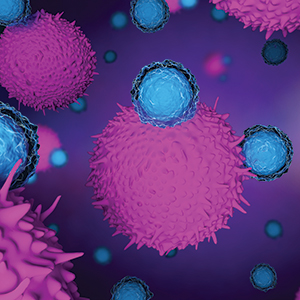-
Treating Breast Cancer in Men
Hormone therapy may lengthen life in men with hormone-related breast cancer, but this treatment is prescribed less frequently for men than for women.
by Marilyn Fenichel
-
From the Editor-in-Chief
Improving Health After TreatmentThe U.S. health care system must adapt to the needs of cancer survivors.
by William G. Nelson, MD, PhD
-
Getting a Read on Cancer
Cancer patients are increasingly receiving treatments guided by the molecular characteristics of their cancer cells. But patients may have unequal access to testing and targeted therapies.
by Kate Yandell
-
Forward Look
A Matter of AgeCell and molecular biologist Ashani Weeraratna discusses how older patients respond to immunotherapy.
by Sue Rochman
-
Forward Look
Treating Head and Neck Skin CancersA study suggests high-risk patients do not need chemotherapy.
by Stephen Ornes
-
Forward Look
In Women, Lung Cancer Rates Are Rising WorldwideLung cancer deaths are set to surpass breast cancer deaths in many regions.
by Cameron Walker
-
Forward Look
Breaking Down Breakthrough Cancer TherapiesDrugs approved through this pathway may have limited evidence.
by Lindsey Konkel
-
Tomorrow’s Trials
New tools are being integrated into the research process to ease patients' access to clinical trials and improve their experience.
by Bradley Jones
-
Forward Look
What’s Next? Winter 2018/2019Off-the-shelf equivalents to CAR-T cell therapy are emerging.
by Bradley Jones
-
2018 SABCS: Choosing the Right Treatment
Studies presented at the 2018 San Antonio Breast Cancer Symposium investigate when patients with early-stage breast cancer or precancerous breast conditions benefit from receiving less intense treatment.
by Kate Yandell
Cancer Talk
The Power of Comedy
In a new play, the pain of cancer can be a chance to laugh.
by Ashley P. Taylor
Melanoma Risk in Childhood Cancer SurvivorsPeople treated for childhood cancer found to have twice the risk of developing melanoma as an adult.
by Cameron Walker
Online Second OpinionsMore than half of patients who participated in a program offering online second opinions were recommended a change to their treatment plan.
by Eric Fitzsimmons
Musical Toxicity an Effect of Cancer TreatmentStudy finding cancer treatment affects ability to play or sing music highlights need for physical therapy, experts say.
by Kyle Bagenstose















